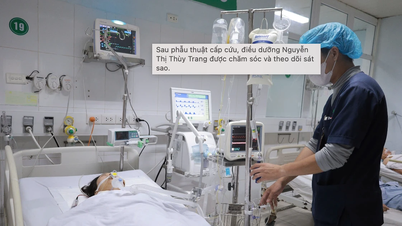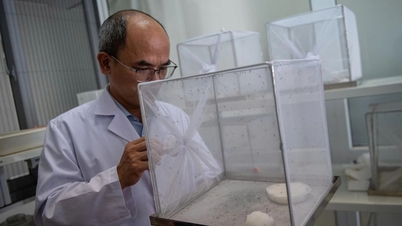In cold weather, many people have runny nose, sneezing..., thinking it's the flu, buying medicine to take, until they have facial pain, persistent stuffy nose, go to the doctor and find out it's allergic rhinitis that has become complicated.
Specialist Doctor Vo Ba Thach, ENT Unit, Tam Anh General Hospital (HCMC) said that cold weather, symptoms of stuffy nose, runny nose, sneezing can easily make patients confuse allergic rhinitis with the flu.
Many people with allergic rhinitis self-treat the flu
According to Dr. Thach, over the past month, Tam Anh General Clinic in District 7, Ho Chi Minh City has regularly received patients with allergic rhinitis, but self-treatment of the flu has not only not reduced the allergic rhinitis but also made it worse, leading to complications such as sinusitis, nasal polyps, etc.
As in the case of Ms. MNB (38 years old, in Ho Chi Minh City), a month ago, when the weather changed, she had symptoms of continuous sneezing, stuffy nose, and runny nose. Thinking it was a common cold, she bought antibiotics and painkillers at the pharmacy to treat it. However, after a week, the symptoms did not improve but became worse with a persistent stuffy nose and facial pain, difficulty breathing, so she went to the clinic for examination.
Dr. Thach performed an ENT endoscopy and diagnosed Ms. B. with allergic rhinitis, but due to incorrect self-treatment, the disease developed into acute sinusitis. Ms. B. was prescribed medication to treat sinusitis and scheduled follow-up visits to monitor the disease and prevent it from recurring and progressing to chronic sinusitis.
Or like Mr. NVQ (45 years old, in Dong Nai ), an office worker who often stays in an air-conditioned room, he often has a stuffy nose and sneezes early in the morning. Thinking it was a common cold symptom, he bought cold medicine and nasal spray containing vasoconstrictors to reduce nasal congestion. After 2 months, the symptoms did not improve but the nasal congestion got worse, and using vasoconstrictor nasal spray still did not help, so Mr. Q. went to see a doctor.
After an ENT endoscopy and clinical examination, Dr. Thach diagnosed Mr. Q. with chronic allergic rhinitis with complications of nasal turbinate hypertrophy, requiring surgical correction of the nasal turbinate. The abuse of vasoconstrictor sprays caused damage to the nasal mucosa, and the nasal turbinate was also over-dilated, causing nasal turbinate hypertrophy.

Doctor Thach performs a nasal endoscopy on a patient.
Symptoms of allergic rhinitis and flu are very similar.
Dr. Thach said that allergic rhinitis and flu have many similar initial symptoms but completely different causes and treatments. Allergic rhinitis is caused by the body's overreaction to allergens such as pollen, fine dust, pet hair, or changes in weather.
When exposed to allergens, the body's immune system is immediately activated to fight these agents and the nose is the main organ that receives the defensive reaction. Patients often sneeze continuously, especially in the morning, have clear mucus, itchy nose, red eyes, itchy eyes, and watery eyes. Allergic rhinitis does not cause fever, is not contagious, and does not require antibiotics.
The flu is caused by a viral infection, progressing slowly over 1-3 days, often accompanied by fever, sore throat, fatigue, occasional sneezing, thick green or yellow mucus, and body aches. The disease can resolve on its own after 7-10 days if treated properly.
Confusion between the two diseases is very common. Arbitrary use of antibiotics to treat allergic rhinitis is ineffective and carries the risk of antibiotic resistance and serious side effects, affecting liver and kidney function. In addition, if patients abuse nasal sprays containing vasoconstrictors, not only will they be ineffective, but they will also damage the nasal mucosa, increasing the risk of complications.
“Uncontrolled allergic rhinitis can lead to sinusitis, pharyngitis - laryngitis due to mouth breathing, nasal polyps, or even lower respiratory tract infections. At the same time, patients spend money and time treating complications,” said Dr. Thach.
Dr. Thach said that if you have symptoms such as constant sneezing, runny nose, and itchy nose, you should think about allergic rhinitis. If accompanied by fever, body aches, and thick nasal discharge, it could be a sign of flu or bacterial sinusitis.
“As soon as symptoms appear, patients should go to medical facilities for proper diagnosis and treatment. Absolutely do not self-medicate, especially antibiotics, and avoid overusing vasoconstrictor nasal sprays without a doctor's prescription,” said Dr. Thach.
Source: https://thanhnien.vn/tuong-bi-cum-tu-mua-thuoc-uong-khien-benh-nang-hon-185250204135239967.htm


![[Photo] Flooding on the right side of the gate, entrance to Hue Citadel](https://vphoto.vietnam.vn/thumb/1200x675/vietnam/resource/IMAGE/2025/10/28/1761660788143_ndo_br_gen-h-z7165069467254-74c71c36d0cb396744b678cec80552f0-2-jpg.webp)

![[Photo] Prime Minister Pham Minh Chinh chaired a meeting to discuss solutions to overcome the consequences of floods in the central provinces.](https://vphoto.vietnam.vn/thumb/1200x675/vietnam/resource/IMAGE/2025/10/29/1761716305524_dsc-7735-jpg.webp)

![[Photo] National Assembly Chairman Tran Thanh Man received a delegation of the Social Democratic Party of Germany](https://vphoto.vietnam.vn/thumb/1200x675/vietnam/resource/IMAGE/2025/10/28/1761652150406_ndo_br_cover-3345-jpg.webp)





























![[Photo] Draft documents of the 14th Party Congress reach people at the Commune Cultural Post Offices](https://vphoto.vietnam.vn/thumb/1200x675/vietnam/resource/IMAGE/2025/10/28/1761642182616_du-thao-tai-tinh-hung-yen-4070-5235-jpg.webp)
![[Photo] President Luong Cuong attends the 80th Anniversary of the Traditional Day of the Armed Forces of Military Region 3](https://vphoto.vietnam.vn/thumb/1200x675/vietnam/resource/IMAGE/2025/10/28/1761635584312_ndo_br_1-jpg.webp)









































































Comment (0)